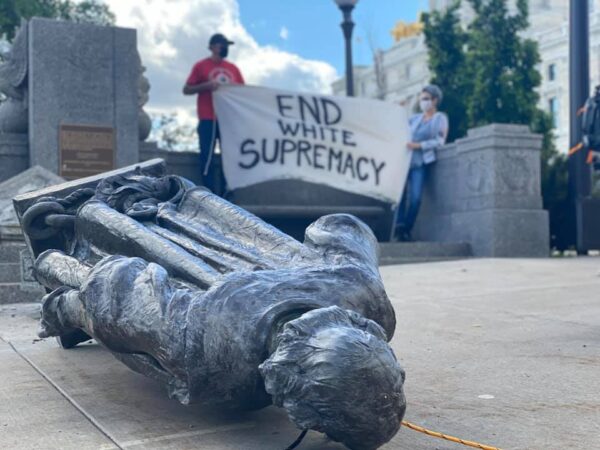
- Details
- By Native News Online Staff
WASHINGTON — In the wake of protests in the aftermath of George Floyd’s police killing in Minneapolis, a movement to remove Confederate soldiers and Christopher Columbus statues has spread in several cities.
In Boston, a group cut the head of a Columbus statue off. In Richmond, Virginia, a Columbus statue was torn down and thrown into a lake. On Thursday, at the Minnesota State Capitol members of the American Indian Movement put a rope around the neck of a Columbus statue and toppled it face down. A flatbed hauled the statue off to an undisclosed location.
On Saturday, the National Congress of American Indians issued the following statement:
The National Congress of American Indians (NCAI), the largest and most representative American Indian and Alaska Native organization in the country, does not acknowledge Christopher Columbus as a hero. To Indigenous peoples, he was the opposite:
[O]ut of timbers for the Santa Maria, . . . Columbus built a fort [on Hispaniola], the first European military base in the Western Hemisphere. . . . He took . . . Indian prisoners and put them aboard his two remaining ships. . . . [H]e got into a fight with Indians who refused to trade as many bows and arrows as he and his men wanted. Two were run through with swords and bled to death. Then the Nina and the Pinta set sail. . . When the weather turned cold, the Indian prisoners began to die . . .
In the year 1495, they went on a great slave raid, rounded up fifteen hundred Arawak men, women, and children, put them in pens guarded by Spaniards and dogs, then picked the five hundred best specimens to load onto ships. Of those five hundred, two hundred died en route. The rest arrived alive in Spain and were put up for sale . . .
Howard Zinn, A People’s History of the United States, 3-4 (1980 Ed.).
“This growing movement across the country to rid our shared spaces of symbols that represent hate, genocide, and bigotry illustrates that it is past time for all cities to stand on the right side of history moving forward,” NCAI President Fawn Sharp said.
NCAI also strongly supports the recent actions taken by United States citizens and the international community calling for proper law enforcement reforms and the recognition of basic human rights for the African American community and all communities of color. We are humbled that these voices are including Indian Country’s perspectives. NCAI encourages local governments and their citizens to seek mutual understandings of their diverse perspectives and to develop peaceful solutions that are mindful of all human beings and our rich distinct and shared histories. Together we can build the tomorrow our children deserve to lead.
More Stories Like This
Native News Weekly (August 25, 2024): D.C. BriefsNative Bidaské: The Illusion of Freedom and the Myth of America 250, Leonard Peltier Speaks Out
Monday Morning (March 2, 2026): Articles You May Have Missed This Past Weekend
Native News Weekly (March 1, 2026): D.C. Briefs
Scope Narrowed, Report Withheld: Questions Mount Over Michigan Boarding School Study
Help us defend tribal sovereignty.
At Native News Online, our mission is rooted in telling the stories that strengthen sovereignty and uplift Indigenous voices — not just at year’s end, but every single day.
Because of your generosity last year, we were able to keep our reporters on the ground in tribal communities, at national gatherings and in the halls of Congress — covering the issues that matter most to Indian Country: sovereignty, culture, education, health and economic opportunity.
That support sustained us through a tough year in 2025. Now, as we look to the year ahead, we need your help right now to ensure warrior journalism remains strong — reporting that defends tribal sovereignty, amplifies Native truth, and holds power accountable.
 The stakes couldn't be higher. Your support keeps Native voices heard, Native stories told and Native sovereignty defended.
The stakes couldn't be higher. Your support keeps Native voices heard, Native stories told and Native sovereignty defended.
Stand with Warrior Journalism today.
Levi Rickert (Potawatomi), Editor & Publisher

